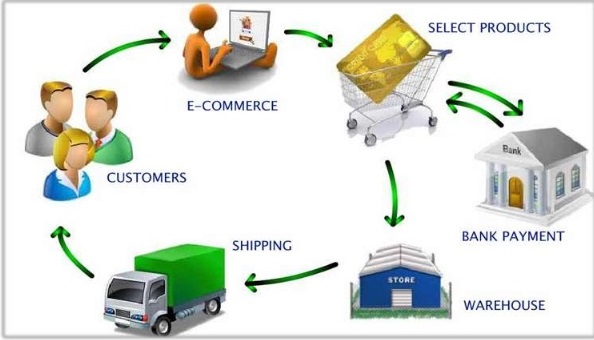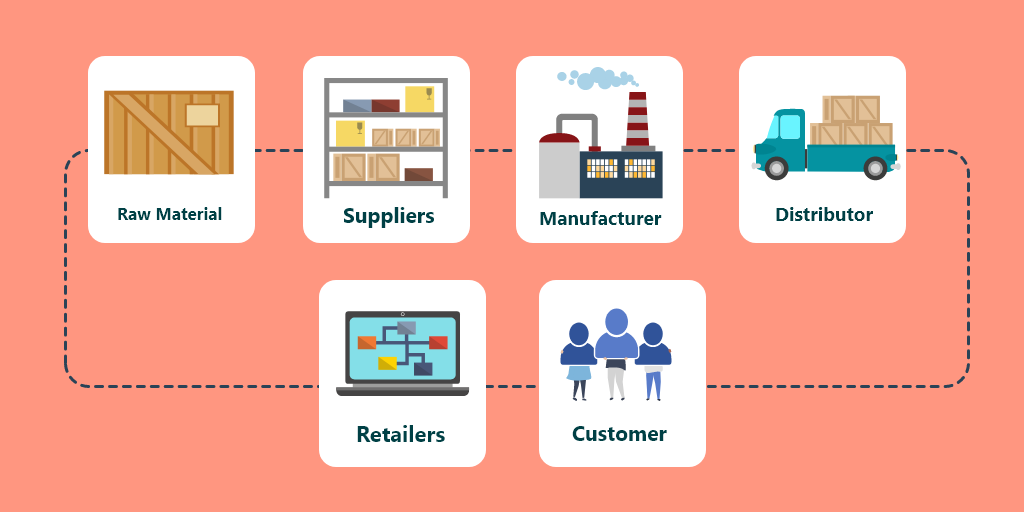Ecommerce giants like Amazon and Walmart have contributed significantly to the growth of the industry as a whole. Their innovative practices have changed the way in which people conduct eCommerce today.
Perhaps the biggest influence these companies have had is on supply chain management. Just look at Amazon’s Prime Air drone delivery service. It’s a revolutionary concept, to say the least.
Smooth experiences, inventory fulfillment, and minimized delivery delays are just the tip of what the customer demands. The entire supply chain – from the supplier to the manufacturer, distributor, and retailer – faces significant challenges to meet them.
If COVID-19 taught businesses anything, it’s the reality that if you don’t adapt to market conditions during a crisis, you’re probably going to go extinct. During the pandemic, we’ve seen companies collapse because they couldn’t adapt to logistics’ challenges and manage customer expectations.
At the same time, companies have excellently adapted to the pandemic, managed the challenges, and have seen a significant rise in sales.
So, what did these companies do, right? The answer? Efficient supply chain management. Let’s see how exactly they achieved that.
But before we begin, let’s lay down some groundwork.
Supply Chain Management (SMC): An Explanation

In simple words, SCM includes all activities that are aimed at getting a product from its manufacturer to the consumer.
To elaborate, SCM involves planning, coordinating, producing, distributing, and fulfilling activities that work in conjunction with one another. All of these activities are meant to deliver the product or service to the end-user.
Successful implementation of SCM involves communication, collaboration, accurate risk, and resource management. SCM is a vital nerve and one that everyone in the hierarchy – from the supplier to the distributor, manufacturer, vendor – heavily depends upon.
Combining SCM with Ecommerce

On a daily basis, the modern eCommerce business faces cut-throat competition from giants and close competitors alike. With the goal of customer acquisition, each company alters its products and services to seem more appealing to the customer.
It all boils down to who is more apt at winning the hearts and minds of consumers. While that competitive front is indeed useful to businesses, making sure the products reach the customer at the right place and at the right time is an altogether different front.
A good supply chain operation integrates your eCommerce platform with all supply chain activities, ensuring streamlined lead capturing, relationship building, and sales.
Better SCM Leads to Better Business Operations
In modern eCommerce, your organizational departments cannot operate within a silo. In the context of SCM, you need to connect it with all aspects of your business processes to ensure maximum transparency and streamlined operations.
Traditional roadblocks like supply shortages, improper utilization of warehouse space, transportation costs, and poor resource allocation can be avoided by integrating your eCommerce platform with your supply chain software system.
Improved Planning

An efficient integration of SCM with eCommerce begins with the planning phase. An audit of the supply chain is performed, and a strategy is devised on how to utilize it best. This entire process involves researching the market, estimating demands, and selecting the best suppliers.
The primary benefit to this is that it lets you develop proper communication channels, permissions, and enable personalization requirements from your vendors.
Better Sourcing
Ecommerce businesses perform sourcing based on their unique business requirements and characteristics. For example, they can choose to develop a long-lasting relationship with one supplier or have a base of multiple suppliers.
By integrating your SCM sourcing systems with your eCommerce platform, you’re gaining significant benefits in terms of improved communication with suppliers, distributors, and even stakeholders.
Best of all, you’re giving out crucial information to your sales representatives, who then use it to assist customers towards a purchase.
Streamlined Inventory Management

Ecommerce operations and inventory management go hand-in-hand. It’s always beneficial to keep a close eye on inventory levels and making sure customer demands are met.
Many businesses manage their inventory based on high and low demand projections. While that is indeed useful, it fails to provide an adequate inventory level required during sudden demand spikes. As we all know, the “out of stock” symbol next to a product entry can seriously harm a brand’s position.
Combining eCommerce operations with SCM helps you accurately organize your inventory levels, maintaining a balanced inventory level during all high, low, and sudden demand periods.
Streamlined Production
Production is an important facet of the supply chain for manufacturing firms. Similar to demand or inventory, production must work in unison with other factors for it to be effective. Because of modern requirements, the production process should be based on data rather than conjecture.
With the correct streamlined process, an organization can even implement Just-in-Time (JIT) processes to ensure that production is done only when there is demand, made ready, and shipped off as quickly as possible.
Better Transportation

To manage their supply chains effectively, eCommerce companies now employ the services of Third-Party (3PL) logistics and outsource their transportation operations to another company. This process is highly dependent on the company in that you can choose to outsource or keep transportation as an in-house function.
A tight logistical integration with an eCommerce platform helps you manage orders effectively regardless of whether your choice is in-house or 3PL.
Efficient Management of Returns
An effective return policy can be made possible through integrated coordination between supply chains, eCommerce platforms, and customer service. As much as possible, customers’ return should be made as simple as can be. If a customer asks for a return in the case of a defective product, companies should move fast to fulfill that request.
The integration mentioned above can prove detrimental in ensuring that the information flow is effective in guaranteeing a streamlined customer experience.
Supply Chain Management Can Be Made Possible Through Ecommerce
An integration of SCM with eCommerce promises reduced costs, opportunity to venture into new markets, and tap into previously inaccessible revenue streams.
Whatever path you choose with regards to SCM in general, ensuring a harmonious data flow between systems can promise significant benefits for your business.
Removing hurdles between data flow can help in improving performance, more granular data, and a faster supply chain overall. Let’s look at the many ways an integration between your eCommerce platform and SCM can benefit you.
Increased Visibility

Demand and inventory increases are directly related to one another. As discussed before, out of stock products can be dangerous to a brand’s identity. The ideal solution to the “out of stock” question is visibility. It would help if you made the user aware of why exactly the product is out of stock.
Such a correspondence with the customer can be possible through integrating your eCommerce solution with your back-office systems.
Increased Personalization
Personalization is the mainstay of any eCommerce setup, regardless of whether it is B2B or B2C. Giving your customer a personalized experience can reap significant benefits for a brand.
For example, you decide to keep your original store for your US audience while also having an eCommerce store with customized currency and language for your foreign audiences. B2BWoo (WooCommerce B2B) is a B2B eCommerce platform that allows you to offer customized pricing, catalog customization, and efficient ordering and checkout functionalities.
Increased Efficiency
Suppliers and merchants are an essential part of eCommerce in general. To maintain a long-term professional relationship with them, you need to make your inventory visible and in top shape.
As the competitive environment grows, business owners also need to look at how the competition utilizes automation to their advantage. A modern eCommerce store can’t be complete without automating certain workflows.
Again, an eCommerce solution can prove beneficial in ensuring that level of efficiency in your business operations.
Increased Flexibility
As discussed in the introduction, many businesses have taken a significant hit due to the current pandemic. The primary failure is that these businesses failed to adapt to the market conditions and failed to manage their supply chain effectively.
Yes, you cannot be as efficient in your processes as Amazon, but you can utilize eCommerce platforms’ benefits in facilitating your supply chain operations. Fortunately, there is still time to recover since the major world markets are still under lockdown.
Going digital can significantly benefit you in facilitating B2B2C, D2C, B2B, and other forms of purchases.
The Benefit of Supply Chain Management in Ecommerce
Personalized experiences, visibility, customizability, efficiency, inventory management, among others, are just some of the benefits of integrating your SCM systems with your eCommerce platform.
The pandemic has hit economies around the world hard, but that doesn’t mean that all businesses are going extinct. Even if you’re not as advanced as the eCommerce giants dominating the market, there is a significant opportunity for small businesses to scale and grow if they’re smart about maintaining their supply chains effectively.
